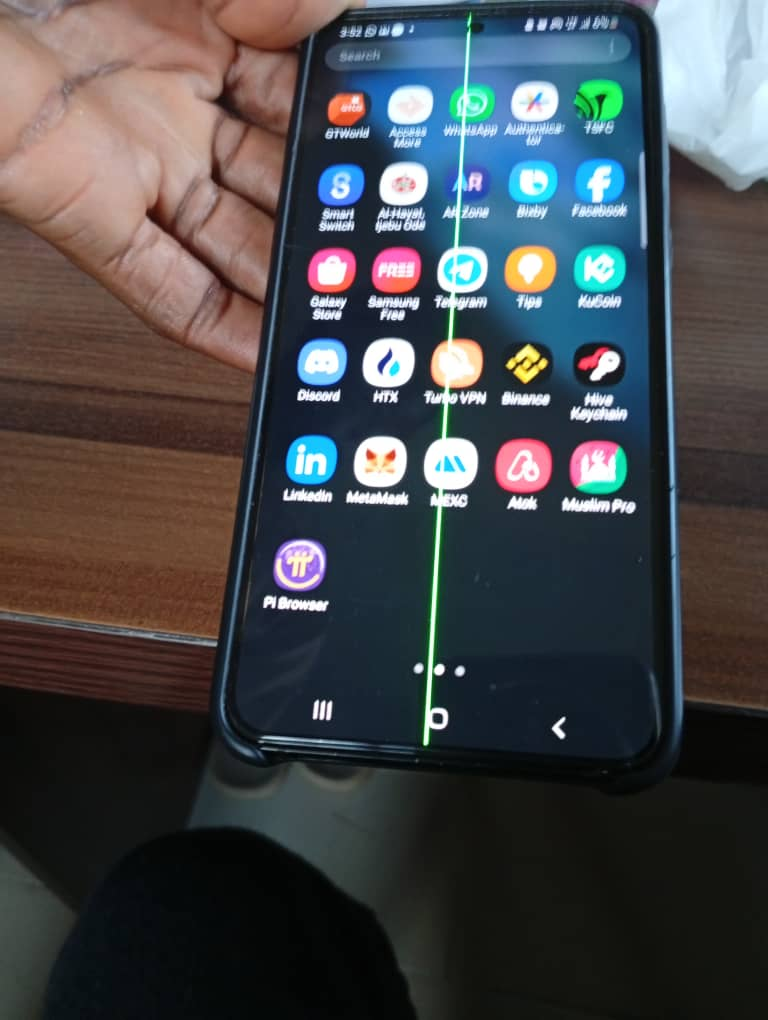My Samsung S21+, which I bought used about six months ago, suddenly developed a green line stretching across the screen from top to bottom. It's a stubborn streak of light that refused to disappear. At first, I thought I wasn’t seeing clearly. Maybe it was a reflection or a software glitch. But after several restarts, consultations, and a late-night deep dive through forums filled with similar complaints, reality dawned on me. The green line wasn’t going anywhere. The only good news, if I can call it that, is that it might not get worse. If I’m lucky, the phone could still serve me for years, minus the aesthetic annoyance of that glowing scar.
I’ve never been one to change gadgets just for the sake of it. My philosophy has always been simple: If it’s still serving me, I don’t need to change it. It’s a principle I’ve practiced unconsciously for most of my life. Something that keeps me grounded in a world obsessed with constant upgrades. I bought the S21+, not because I wanted to flex the latest specs or climb the technology ladder, but because my old Samsung Galaxy Tab, bought in 2017, had reached its limit. With 4GB of RAM, it struggled to keep up with modern apps and multitasking. I needed something that could handle my workload efficiently, not something that would impress people.
But, come to think of it, this isn’t the first time I’ve experienced that uneasy feeling that comes with owning too much. Around 2021, I bought an HP laptop after quitting my lecturing job that was slowly draining the life out of me. I had chosen to go into full-time freelancing, and my old laptop was holding me back badly. It froze often, crashed during meetings, and couldn’t handle design software. I wanted to learn UI/UX design, and after some consultation, I was told a laptop with a dedicated graphics card was a good fit. So, I went all in and got myself a high-end HP laptop. It was a gaming laptop, the kind that turned heads.

Everyone who saw it reacted with admiration. Some even expressed envy. But inside, I was anything but happy. I felt I was massively underutilizing the machine. It was like housing a lion in a chicken coop. The laptop had so much power, yet my needs were so basic. It didn’t align with my reality, and that disconnect gnawed at me. I wasn’t earning enough to justify it, and I could feel the irony. The machine that was supposed to empower me was actually weighing me down.
Last year, I finally decided to let go. I sold the laptop, bought a modest one that could handle everything I needed without making me feel guilty, and had some change left to settle pressing bills. That decision brought me a sense of peace I hadn’t felt in a while.
The same mindset applies to my phone today. The green line doesn’t bother me as much anymore. In fact, it feels like a metaphor. A kind of reminder that imperfection isn’t failure, and that value isn’t tied to shine. Yet, the world keeps pushing a different narrative.
When I worked at a private university, I once conducted a casual survey among students using the latest iPhones. Only a handful could justify their choice beyond the camera quality. For most, the reason was unspoken but obvious. It wasn’t about what the phone could do; it was about what owning it meant. It was a badge of status, a ticket into perceived sophistication.
We’ve built a society where consumerism is no longer just an act but a culture, and a subconscious competition. The new equals better, and the old equals failure. People upgrade their lives like apps; endlessly downloading, deleting, and updating, yet never feeling complete. The more we consume, the emptier we often become.
Just yesterday, something happened that perfectly illustrated this creeping mindset. I got a call from my wife and my two boys while I was at an event a little distance from home.
Daddy, we are craving shawarma. Please get some for us on your way back.
I paused for a moment. Craving shawarma? Neither my wife nor my kids had ever tasted it before. How can you crave something you’ve never even experienced?
Then it hit me. This is what modern consumerism looks like. We crave what we see others having. We desire things not because we need them, but because we’ve been told we should. It starts subtly, a post here, an ad there, until it embeds itself deep into our subconscious. Suddenly, our wants are no longer ours; they’re rented from society’s expectations.
We buy, not out of necessity, but out of curiosity. We upgrade, not because we’re unsatisfied, but because we’re told to be. We chase happiness through possessions, forgetting that happiness is a state of mind, not a purchase order. In the end, true satisfaction doesn’t come from owning the best. It comes from knowing that what you have already serves your best purpose.
Posted Using INLEO